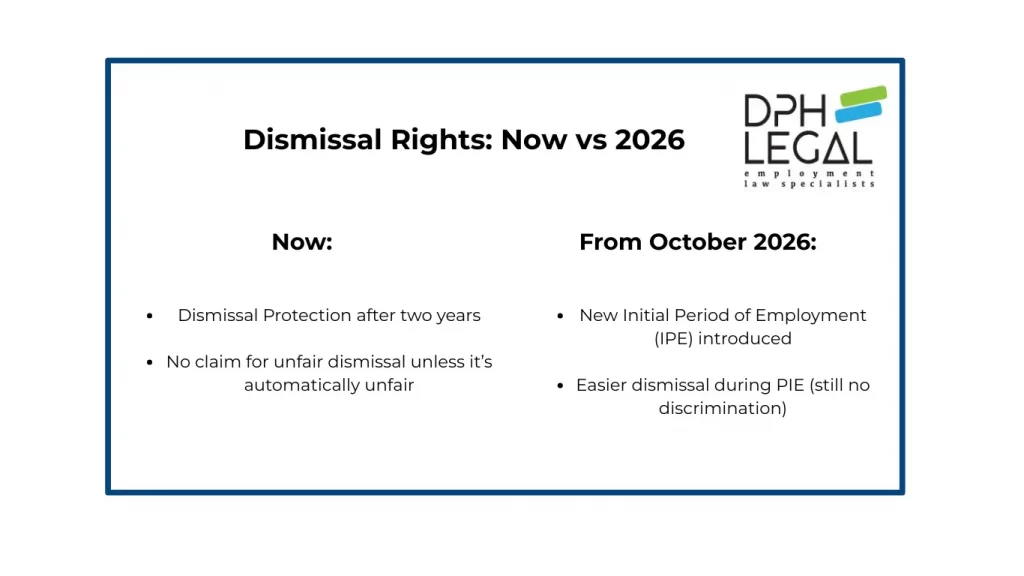Right now, employers can dismiss someone with less than two years of service. They don’t need a fair reason unless the dismissal is discriminatory or automatically unfair (like whistleblowing or pregnancy).
From October 2026, the rules will change. Employees will get unfair dismissal protection after just one year. A new “Initial Period of Employment” (IPE) will also begin. During the IPE, it will still be easier for employers to dismiss staff, but they must follow the law and not discriminate.
The exact length of the Initial Period of Employment (IPE) has not yet been confirmed by the government.

Your Rights After Two Years (Until October 2026)
Currently, if you’ve worked continuously for two years, you get extra legal protection. Employers must show they had a fair reason to dismiss you. They also need to follow the right steps. If not, you may have a claim for unfair dismissal.
5 Fair Reasons for Dismissal
According to the Employment Rights Act 1996, these are the fair reasons:
- Capability or performance
- Misconduct
- Redundancy
- Legal reasons (statutory restriction)
- “Some other substantial reason”
Can You Claim Unfair Dismissal with Less Than Two Years?
Until October 2026, you usually cannot. There are exceptions. These include:
- Pregnancy or maternity leave
- Whistleblowing
- Being in a trade union
- Asserting legal rights (like asking for holiday pay)
These are called “automatically unfair dismissals.”
What Is an Automatically Unfair Dismissal?
This happens when the law says the reason for your dismissal is unfair, no matter how long you’ve worked. Common examples include:
- Pregnancy or parental leave
- Trade union activity
- Reporting wrongdoing (whistleblowing)
What’s the Difference Between Unfair and Wrongful Dismissal?
Unfair dismissal is about the reason for your dismissal and whether your employer acted fairly. Wrongful dismissal is about your contract. It usually means your employer didn’t give you the right notice.
Constructive vs Unfair Dismissal
Constructive dismissal means you quit because of your employer’s bad behaviour. You felt you had no choice but to leave. Unfair dismissal means your employer ended your contract without good reason or didn’t follow the correct process.
Problems with Dismissing Someone Before Two Years
Even though it’s currently legal to dismiss someone before the two-year mark, it’s still risky for employers. If the reason is unfair or linked to discrimination, it could lead to a legal claim.
Discrimination Claims
Employees can claim discrimination at any time, even with less than two years’ service. Discrimination could be based on:
- Age
- Disability
- Pregnancy
- Race
- Religion
- Sex
- Sexual orientation
Breach of Contract
If your employer doesn’t follow the rules in your contract, you can claim for breach of contract. For example, if they don’t give you proper notice.
Looking Ahead
The changes coming in October 2026 mark a significant shift in UK employment law. Employers should start reviewing their contracts, procedures and training now to prepare.
If you’re unsure how these changes affect your business or your job, seeking legal advice early can help you stay compliant and informed.
Dismissal Advice for Employers
If you’re thinking about letting someone go, get legal advice first. Make sure the reason is fair and that you’re not breaking the law. This helps you avoid costly legal claims and keep things fair for everyone.
Need Help with Dismissal or Employment Rights?
If you’ve been dismissed or are unsure about your rights at work, we can help. Contact our expert unfair dismissal solicitors today for clear advice and support tailored to your situation.
